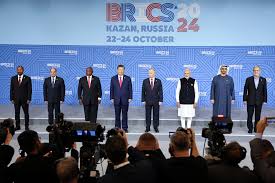BRICS Leaders Call for Global Governance Reforms to Reflect Emerging Power Centers
The group rejected unilateral trade restrictions that violate WTO principles and called for fair treatment of developing economies within the organization.
- Advertisement -
Leaders of the BRICS nations at the 16th BRICS Summit, held under the banner “Strengthening Multilateralism for Just Global Development and Security,” have underscored their commitment to a multipolar world order, calling for sweeping reforms in global governance structures to better reflect the rise of emerging economies.
In the Kazan Declaration, BRICS leaders acknowledged the shifting geopolitical landscape, emphasizing that the emergence of new centers of power and economic growth offers an opportunity to create a more equitable and democratic global system. The bloc reaffirmed its support for multilateralism and the central role of the United Nations, stressing the need for reforms that grant greater representation to emerging markets and developing countries (EMDCs), particularly within the UN Security Council.
- Advertisement -
The BRICS leaders also advocated for enhanced representation of EMDCs in key global decision-making bodies, including the International Monetary Fund (IMF) and World Trade Organization (WTO). The declaration called for the modernization of the WTO, with a focus on reforming its dispute settlement system and promoting a rules-based, transparent trade environment. The group rejected unilateral trade restrictions that violate WTO principles and called for fair treatment of developing economies within the organization.
- Advertisement -
On global financial governance, BRICS called for a recalibration of the Bretton Woods institutions, including a realignment of IMF quotas to reflect the growing economic influence of emerging markets. The leaders welcomed recent steps to increase the representation of Sub-Saharan Africa within the IMF and urged further efforts to make the international monetary system more responsive to the needs of developing nations.
- Advertisement -
The declaration further addressed pressing global issues such as sustainable development, climate change, and biodiversity. BRICS leaders condemned unilateral coercive measures that hinder development goals and called for enhanced financial support and technology transfer to developing countries. The group also reiterated its commitment to the 2030 Agenda for Sustainable Development, emphasizing that climate action must respect national priorities and the principle of common but differentiated responsibilities.
Overall, the Kazan Declaration reinforces BRICS’ vision for a more balanced global order, positioning the bloc as a critical player in the push for reforms in international institutions that better reflect the realities of the 21st century.
Source:norvanreports.com
- Advertisement -



